The Vaccine Hesitant are Primarily Non-Voters
New polling provides useful insights into the problem.

CNN’s Harry Enten explains “Why politicians won’t reach the vaccine hesitant.” The answer wasn’t what I was expecting.
The basic problem is one with which most OTB readers will be familiar:
A new Kaiser Family Foundation poll finds that 64% of American adults have gotten or want a Covid-19 vaccine as soon as possible, 15% will wait and see and 19% will either definitely not get one or will only get one if it is required. This data matches up with other polling that suggests that roughly 60% to 65% of American adults want a shot or have had one, 15% to 20% will wait and see and 20% don’t want one.
Here’s what’s surprising:
A lot of attention has been spent on Republicans being the problem, leading to calls for former President Donald Trump to address the group. A look at the data reveals that the vaccine hesitant group, however, are not big Trump lovers. They’re actually likely not to be Republican. Instead, many of them are people who are detached from the political process and didn’t vote for either major candidate in 2020.
The most recent Kaiser poll helps illustrate that the vaccine hesitant group doesn’t really lean Republican. Just 20% of the group called themselves Republican with an additional 19% being independents who leaned Republican. The clear majority (61%) were not Republicans (41% said they were Democrats or Democratic leaning independents and 20% were either pure independents or undesignated). This is very much unlike the vaccine resistant group, of whom 55% are Republican or Republican leaning independents. Just 21% of that group are Democrats or Democratic leaning independents.
To be clear: former President Trump and other Republican politicians absolutely made this problem worse by downplaying the disease and making supporters suspicious of countermeasures and the advice of the CDC and other experts. And that at least partly explains why the Hell No group is disproportionately Republican. (There’s of course a chicken-egg problem here, in that those who are suspicious of government and experts are more likely to vote Republican.)
But there’s something else going on as well:
There isn’t going to be a single ideological message that appeals to a majority of the vaccine hesitant group. They’re of all political stripes.
The March Kaiser Family Foundation poll shows us another issue: Traditional political type messages may not work on them either. That poll asked respondents whether they were registered to vote and for whom they voted for in the 2020 election. The overwhelming plurality (48%) were people who either didn’t vote, voted third party or weren’t willing to disclose who they cast a ballot for. The rest were split 31% for Trump and 20% for President Joe Biden.
The poll gets at the fact that the efforts to vaccinate the population isn’t a political campaign to reel in voters. If we use traditional election tactics to reach the vaccine hesitant group, we’re likely to lose.
And here’s what’s so hard for people like us to remember:
Just 62% of the voting age population cast a ballot in 2020, even though the election featured the highest turnout in a long time. The number of adults who didn’t vote was larger than the number of people who voted for either Biden or Trump. [emphasis mine -jj]
Again: politics matters a great deal. Party identification is a key indicator of attitudes toward the virus and the various precautions around it. But roughly four in ten adults are completely checked out from politics and, indeed, the news of the day.
Relatedly:
People who are not registered to vote are among the most likely to say they’re in the wait-and-see camp. In a Monmouth University poll last month, 34% of adults who were not registered to vote said they wanted to “see how it goes” (i.e. wait-and-see) before getting a vaccine. That was significantly higher than the 10% of registered voters who said the same.
Another way to look at this is that most political campaigns are focused on older people because they make up the lionshare of habitual voters. The people who are vaccine hesitant are not old. The clear majority (about 60% to 70%, depending on the poll) are younger than 50. These are largely not going to be people who watch cable news.
Now, of course, this works both ways.
Younger people tend to care less about politics because they have less at stake.* As people get older, they pay more in taxes, buy homes, have children, and otherwise have more reason to care about what the government does. And the elderly get Social Security and Medicare, so they interact with the federal government routinely.
And, as far as COVID-19 goes, younger people are, all things equal, less likely to suffer severe symptoms if they contract the disease. Which explains why such a huge percentage of personnel in our armed forces, particularly younger members of the enlisted force, have thus far refused to get vaccinated. (Because the vaccines are all under “emergency” approval from the FDA, the Defense Department has not made it mandatory. And, frankly, younger enlisted folks have so few opportunities to say No, I suspect a lot of them are doing so just because they can.)
Regardless, Enten argues, we’re not going to persuade these folks via earnest messaging from political leaders.
According to the polling, there are a lot of different ways we might be able to do that, such as making it easier to get the vaccine and confronting falsehoods about the vaccine.
The good news is that people, especially younger people, are far more likely to get a vaccine when they know someone else who has gotten one. If professionals can get a single person in a social circle to get a vaccine, it will make their overall job of getting people vaccinated that much easier.
I still think the key is to make being vaccinated more obviously beneficial through vaccine passports or other methods to allow those who do their civic duty to more easily participate in public activities than those who refuse.
*UPDATE: As @Nightcrawler correctly notes in the comments, it’s not really true that younger folks have less at stake given that they’ll have to live with the long-term implications of today’s policies. But the immediate impact is simply not perceptible to many in the cohort.

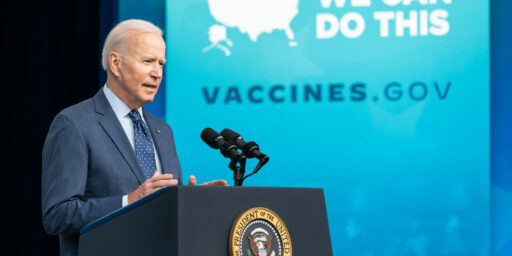
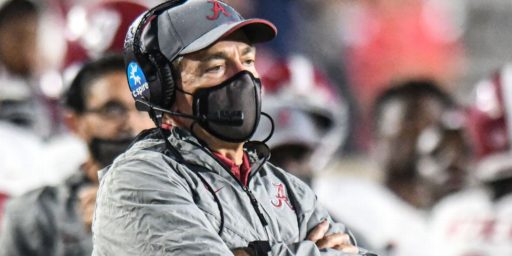
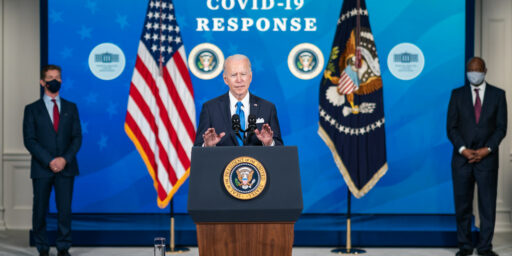
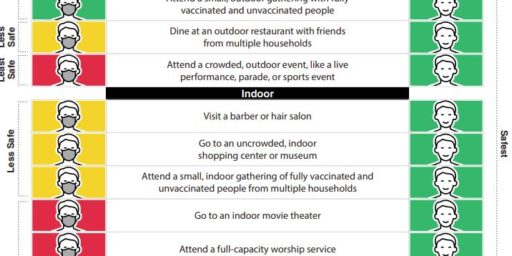
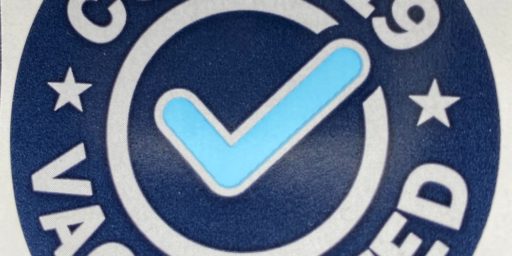
Yeah, and that excuse ain’t gonna last long. Proper approval is on its way and then we’re really gonna see it hit the fan. Right now they have a legal fig leaf – they’re unsure because it’s “so new it’s not been properly studied” and thus the temporary approval. What’s gonna happen when the official stamp comes down? It’s been almost a year since Pfizer’s emergency grant so there’s your body of proof.
…. except they do. Someone in their extended family or coworkers or teachers will have gotten one. There’s virtually no person left in this country that isn’t six degrees from someone who’s been vaxxed or has gotten ill / died of COVID. What that sentence means is one of their friends (and that’s a flexible term) who they trust and now we’re back to middle school trying to figure out who’s friends with whom. Plenty of people are cutting off those who’ve been vaxxed from their social circle since whatever conspiracy theory they hold means the friend gave into evil. Social groups already splintered because of MAGA and Trump’s BS are seeing those who vaxx get excised as RINOs or worse.
You want the young and the hesitant to get their shots? Tie it to student debt relief or a cash payout. Money, honey. $500 to get vaxxed or a grand or more forgiven from your debt – your choice. We will still see a large refusal group of the truly paranoid but this will reel in those who just didn’t care.
Some breweries in Buffalo are having vaccine days and giving a beer to anyone who gets vaccinated — “a shot and a beer”. I think we’re going to do it in here in Rochester, too. I agree with James that social benefits like vaccine passports are good, but we’re still at the point were a few gentle incentives like free beer work, too. We need to pass and enforce mandatory paid days off for people who get vaccinated, because there are a lot of minimum wage / contract workers for whom two days off of work to deal with side effects are financially devastating.
This is how I thought it would play out:
– About 50-60% of people would get vaccinated with little or no prompting
– Another 15-25% of people would get vaccinated once it is available at their doctors, or at their workplace
– Another tranche will get vaccinated because it is required for something they want to or need to do (attend school, visit a foreign country, etc.)
So I always though we would end up 70-85% vaccinated. Complicating this is the fact that for the most part it takes two shots, that it has difficult refrigeration requirements, and that it is not yet available to children.
People who are interested in something always greatly overestimate how interested other people are in it. That’s true of sports, of music, of movies, of arts, and especially about politics. Most people, even if they vote, don’t spend ten minutes thinking about it beforehand, they just vote they way they’ve always voted. Most of the talk of voters supporting a politicians policies or ideologies are as realistic as thinking a baseball team’s fans are aware of the detailed stats and tactics involved in the game.
Most Trump voters, like most Biden voters, know and care very little about what either said. They voted for their team (like voting Yankees vs Red Sox). The good thing about that is that someone like Trump has far less long term influence than his vote total suggests. The bad thing about that is that someone like say Obama had far less long term influence than his vote total suggested. And that shows in these vaccination results.
People simply are far less political than people on sites like this think. Its the same lessons scientists have had to learn about the general knowledge and interest in science over the decades — thinking that everybody knows the basics of genetics, statistics, quantum mechanics, evolution etc seemed like a safe bet, but turned out to be false. And the key word is interested. Science and politics both have great influence on people’s lives (I’d argue science has a greater influence, given that we’re ultimately physical beings, but both are vital), but most people know little about either.
Not really shocked that this is a problem on both sides of the political aisle, there are wealthy enclaves in the Bay Area where folks are frustrated because of the anti vaxxers. The ignorance is strong in some Democrats too.
What this survey shows is that a big problem in this country is how many are checked out of politics or the news and feel that makes them blissfully ignorant when all it really does is make it easier for folks like Trump to hijack the levers of power in this country. Alas. right now this is a problem without an easy solution.
Speaking of the shot, I get my 2nd shot this afternoon.
This is why market research is so important. It can uncover insights that completely upend so-called “common sense” assumptions.
One beef:
Younger people tend to care less about politics because they have less at stake.
They don’t have less at stake; they just think they do. Younger people actually have more at stake than oldsters, because they’re going to have to live with the long-term repercussions of any decisions made now, including repercussions that will continue long after the oldsters are dead.
I point to the mass shootings blog as one example. Mass shootings are now so commonplace, schools have active shooter drills, and incidents no longer automatically make the national news. Eventually, pretty much every child under about the age of 10 today will, by the time they reach age 18, know somebody who was killed or maimed in a mass shooting.
@Nightcrawler:
A fair correction. But, yes, I’m thinking immediate term.
@Nightcrawler:
I agree that young people only think they have less at stake.
I’m not sure that mass shootings are the best example though — my understanding is that they’re a very small percentage of homicides in the United States (they get far more press than their numbers warrant). The extremely high overall homicide rate seems to be statistically a much better reason for young people to be concerned (and perhaps get on board gun-control) than mass shootings in particular.
First we had nuclear attack drills: Diving under our desks in case the Russians declared war on us.*
Now we have active shooter drills.
*I always found these idiotic, since a) I was pretty sure the Russkies weren’t going to waste a bomb on my small rural elementary school, and b) if they did drop the big one, a desk wasn’t going to protect me from the explosion.
@CSK:
Dammit, I think I meant this for the mass shootings piece.
How far into the future does the average person takes their worries or concerns?
Even if you’re unlikely to get seriously ill from COVID now, odds are you’ll be very likely to get seriously ill in a few years, if the virus keeps circulating widely. And the best way to keep that from happening, is to vaccinate as many people as possible as soon as possible.
Also, unlikely is not the same as impossible. Young people, even teens, have died of COVID or spent time in the ICU. More have had long term consequences.
IMO, one big problem is the notion of asymptomatic cases. The number of such seems to be relatively small. What happens is people transmit the virus before they show symptoms, which is presymptomatic transmission, not asymptomatic. But using the term asymptomatic has led people to think most infections cause zero problems.
I wonder, too, if we’ll ever know. A reliable antibody test applied to a representative sample of the population of a region, state, country, continent, or the world, would be a good indicator. But such a test won’t work to determine asymptomatic cases after widespread vaccination.
@CSK: with some nuclear ordinance, being under a metal desk makes it worse bc particle cascade. 🙂
@Teve: Fortunately, 3rd graders don’t know that (and neither do their teachers and administrators), so on with the show Mouseketeers!
@Teve:
These were pressed wood or particle-board desks. Bur really, if a nine-year-old could figure out they were useless, then why were we put through this charade?
Has anyone considered that the non-voting wait-and-see vaccine people are just generally passive people who don’t really do anything unless they HAVE to do it?
@Northerner:
The extremely high overall homicide rate seems to be statistically a much better reason for young people to be concerned (and perhaps get on board gun-control) than mass shootings in particular.
It’s going to get a lot worse, especially if SCOTUS strikes down all laws related to concealed carry.
I’m not anti-gun, but I am anti-“any nut who wants a gun should be able to get one and take it wherever they want.” Me being armed — and willing to kill — means absolutely nothing if a perp gets the drop on me and kills me before I can even pull my weapon.
Too many gun owners are irresponsible, mentally unstable, or both.
Stormy, yeah…normally, I am one of those folks. When it comes to the flu shot I am not a fan of shots so I drag things out and sometimes get the shot, sometimes not.
For this though, I actually wanted to get it over and done with asap!! To the point where every time I would read about someone being done with their 2nd shot (including my family members) I was all hurry up and get here May 10th, lol. The good news is that what, about 160m folks have received at least 1 shot, but yes, there are plenty of folks who qualify yet to get poked.
Better to get it removed from your to do list so you can start to plan possible travel plans in the future, stuff like that. Again, normally I sometimes flake on things like the Flu shot but jeebus, for all the whining about folks wanting to get back to gyms/bars/restaurants there sure are a lot of these same whiners who refuse to get the damn shot! A good chunk of folks in the US (again, folks who are Ds, Rs, Independents, whatever) have let the anti-vaxxers and folks like Fox News infantilize themselves to the point where they are unable to make their own decisions in life.
There a lot of sad sacks in America right now, but hopefully this slowly changes and we are still in the first half of the year with plenty of time left for 2021 to continue to markedly improve.
@Kathy:
How far into the future does the average person takes their worries or concerns? Even if you’re unlikely to get seriously ill from COVID now, odds are you’ll be very likely to get seriously ill in a few years, if the virus keeps circulating widely.
I take mine way too far, which is one of the reasons why I harbor such dark views. It’s a defense mechanism rooted in having been struck by trains I never saw coming because I didn’t think far enough ahead, I ignored all the red flags that kept popping up, or both.
I fear COVID-19 infection more than I do cancer recurrence. Others feel differently, and although I don’t share their views, I won’t tell them how they “should” feel. How each of us defines quality of life is deeply personal.
Not really surprising. A lot of Americans have this innate skepticism that isn’t about partisanship.
It’s also useful to note that vaccine hesitancy is higher in several European countries, and many other countries globally, so I think it’s difficult to attribute hesitancy to domestic partisanship. Even Japan, one of the most socially cohesive nations on the planet,
oops, hit the post button by accident, and no edit function. The last sentence should be:
Even Japan, one of the most socially cohesive nations on the planet, about 1/3 of the population is hesitant, equivalent to the US.
@Teve:
I think a desk, even one made of wood, would be protective against the initial thermal flash, if far enough away. I think that reaches farther than the blast wave.
The only real defense against a nuke is to be very far away from it when it goes off.
@Andy: I wonder about Japan and other Asian countries that have a (to me) extreme view of blood purity and the need to maintain your body in harmony. When I was in China people were horribly fascinated that I regularly donated blood, as I was throwing off my bodies natural balance. This, despite the fact the Chinese blood banks took less than half we do in the states and then only every six months as opposed to two months here.
It’s a wonder that take any medicine….
@Kathy: We had to get under desks for tornado drills. It was for protection against debris falling, not from the tornado itself.
@CSK:
Ayup, we all had to get under the desks in Seattle, because the Ruskies were gonna plaster Boeing. Why we had to hide there in Lynden was a question for the ages.
That being said, knowing how stupid it was at 8 years old was one of three reasons for my frequent trips to the principals office. One of the other two involved my refusal to say the “correct” version of the Pledge of Allegiance, because I was taught at home that “under God” was a late add we didn’t use. School’s usual answer was that was because Grandma was a godless communist. Well, they were half right.
@flat earth luddite:
Because you were close to Vancouver, BC. Also because even then there was a petroleum transshipment port in Anacortes. Washington had a lot more targets than we realized. And ignorance was probably bliss, too, in this case.
@Just nutha ignint cracker: The excuse my teachers gave us was because we were so close to the Air Force base in Cheyenne. Then I got to looking at wind patterns and realized it was the bases west and north of us that were really gonna rain radioactive particles, so desks were useless and we might as well dig a bunker to live in for the duration.
She didn’t argue with me, and she let us dig a hole. It was about 5 ft deep, 12×14, but school let out before we got to talk about what we were gonna do for a roof or how much deeper it needed to be to survive.
I went to a really remote rural school at the time, 14 kids grade K-8. Good way to keep kids that age occupied is digging holes, now that I’m an adult I can see why she gave it the green light for recess activities. 😛
I HAZ AN EDIT BUTTON!!!
I went to “town school” after the hole-digging year, but my little brother reported that the school bunker we had dug was filled in when school started in the fall, and there were two trees planted on that spot.
@Jax: So you found out why the really let you dig the hole, eh? Still, it was a good cause, and the community thanks you for your service. 😀
I have never had any vaccinations period. None! I I don’t plan on starting with the trial COVID vaccine!